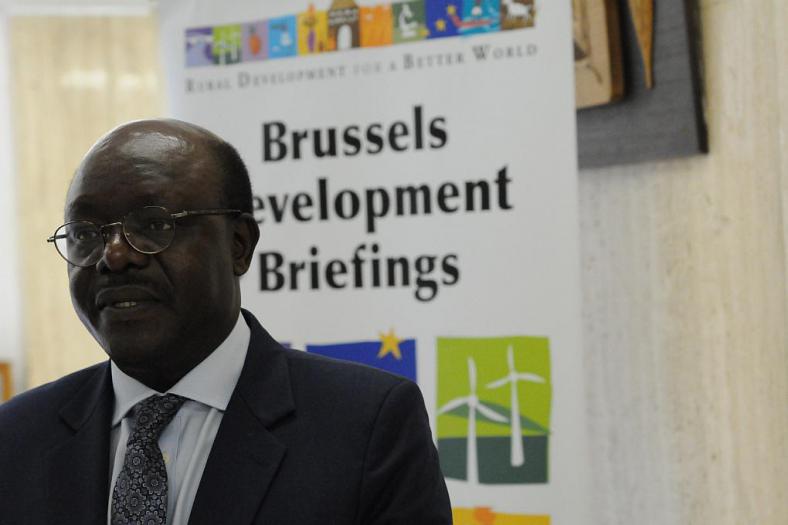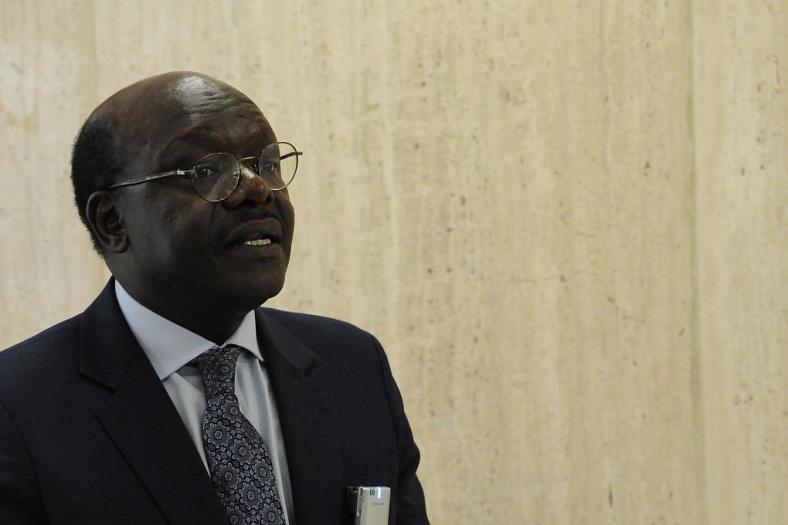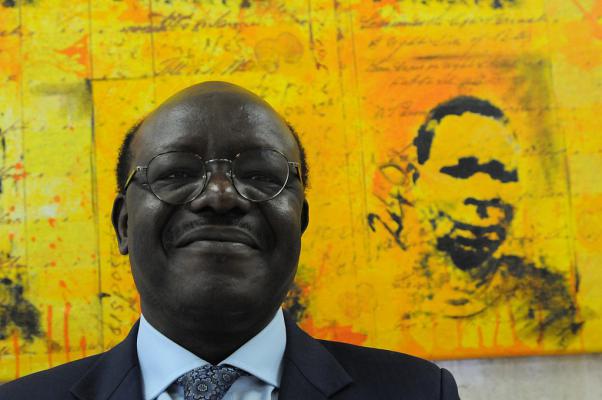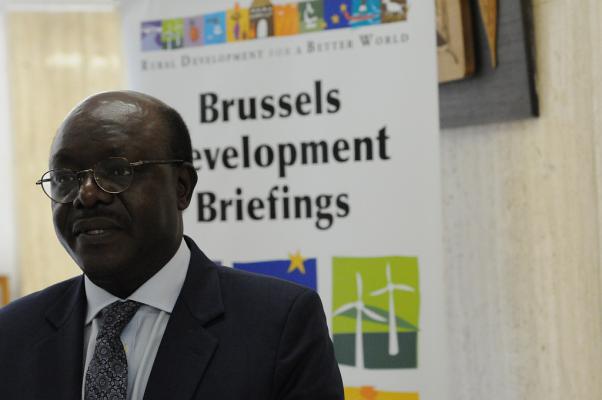Gie Goris was van december 1990 tot september 2020 voltijds actief in de mondiale journalistiek, eerst als hoofdredacteur van Wereldwijd (1990-2002), daarna als hoofdredacteur van MO* (2003-juli 20
‘Africa needs more mutual trade in these times of economic nationalism’
Mukhisa Kituyi, previous Kenyan minister of Trade and Industry, is secretary-general of UNCTAD, the UN-organization for Trade and Development, since 2013. MO* interviewed him about the importance of and the barriers for regional trade in Africa. ‘We need to counteract the worldwide trend that regards multinational agreements as suspicious and believes in economic nationalism’.
Africa’s contribution to world trade is small and declining: from 6% in 1980 to 2.4% today. ‘Moreover, 57% of its export still consists of raw materials,’ Kituyi states, ‘signifying that Africa is still stuck in economic activities that result in little added value and few jobs.’
That problem is even bigger for the growing trade with Asia compared to the export to Europe. For example, only 5% of its trade with China consists of finished products. In addition, 56% of payments made in Africa takes place via non-African banks, resulting in the export of the financial benefits of the transactions.
Mukhisa Kituyi was invited as keynote-speaker at the Brussels Policy Briefing on regional trade in Africa. The conference was organized by CTA (Technical Center for Agricultural and Rural cooperation), IFPRI (International Food Policy Research Institute), the ACP (African, Caribbean and Pacific Ocean states) secretariat, European Commission (DG Devco) and Concord (umbrella of European developmental organizations). www.cta.intTrade among African countries results in added value and consequently yields more jobs. However, this intra-African trade remains pitifully low in comparison to other regions in the world. Within the African Union the internal trade amounts to only 11% of total trade, whereas this is 80% within the European Union and 50% in developing Asia (excluding Japan).
This is due to, amongst others, the high import tariffs being imposed in Africa: with an average of 8.4% these import tariffs in Africa are almost four times higher than the average in the rest of the world (2.4%).
The agricultural sector is extremely important in Africa: it provides 65% of employment, 17% of GNP and 40% of export income. Furthermore, population increases very rapidly, while also urbanization augments faster than in other continents.
At this moment Africa depends heavily on food imports. It imported food for 234 billion dollars between 2002 and 2012. Sixty percent of wheat and flower consumption and 40% of rice consumption in Africa are imported from the rest of the world. Africa also depends heavily on the rest of the world for products like fish, sugar and milk.
20 percent of agricultural exports from African countries goes to other African nations as opposed to 37.5% to the EU and 31.7% to Asia. 15 percent from agricultural imports comes from other African countries, against 28% from the EU and 25% from Asia.
Kituyi: ‘One of the causes of this permanent underrepresentation of regional and intra-African trade is that African trade policy is determined by national governments in accordance with large agro companies, without participation of the small farmers. Therefore their border-crossing trade is easily considered as ‘smuggling’ while the large companies are engaged in formal trade. But border inhabitants actually benefit most from border crossing trade.’

Mukhisa Kituyi: ‘The problem is that economic nationalism is dominant in Africa, too, notwithstanding the growth of regional trade blocks.’
© Gie Goris
Those small farmers and their unions almost all oppose the big free trade deals and especially the EPA’s (Economic Partnership Agreements) pushed by the EU.
Mukhisa Kituyi: Most small farmers in Africa are active on local markets; they are – except for Kenyan flower growers for example – not involved in international trade. They are therefore only worried about the EPA’s when subsidized European agricultural products threaten to disrupt the local African markets even further.
Apart from the European EPA’s, the Doha-Development round from the Word Trade Organization was presented as a necessary leap forward for the developing countries. That was opposed by numerous farmers’ organizations. Meanwhile that trade round is more than 15 years old and dead as a doornail. Do you still expect something to come out of this?
Mukhisa Kituyi: I am rather pessimistic about multilateral solutions for the access of agricultural products to the world market, and especially about the Doha round. The tendency switches completely to the opposite direction: multilateral is suspicious, nationalism is popular. At the same time, it is impossible for African countries to negotiate fair bilateral treaties with big- trade partners who dispose of multiple well-skilled negotiators.
My big concern is today’s distinct tendency towards more protectionism, or call it economic nationalism, in the world. This may very well turn out to the disadvantage of the African farmers.
You nevertheless conclude that African economies are hardly integrated in the international markets. Doesn’t this new protectionism then pose a problem rather for the rich Northern countries and the emerging countries from Asia?
Mukhisa Kituyi: If imports from other continents are more restricted by the North, this means in the first place that all the growth opportunities for African trade – which are enormous because of the low starting position nowadays – will also slow down. On the other hand, that negative outlook should incite us to further promote trade among African countries, as that is where its greatest potential can be found.
The problem is that economic nationalism is dominant in Africa, too, notwithstanding the growth of regional trade blocks. For example, the Tanzanian government several times blocked the export of corn to Kenya as a shortage threatened in their own country. As such it is difficult to speak about a common market. Those political interferences disrupt the intention of regional integration.
In addition, the bureaucratic burdens on border crossing trade probably constitute the main obstacle. At the border between Uganda and Congo you initially need to fill out a load of papers in English, after which, a few meters further on, you must go through similar paperwork, but now in French. Just imagine what an improvement it would be if there were just óne customs control with language support for everyone. Let alone the administrative desire to facilitate or stimulate trade.

Mukhisa Kituyi: ‘Our task today is to replace the colonial infrastructure by a productive and integrated infrastructure.’
© Gie Goris
How do you explain the lack of political will?
Mukhisa Kituyi: During the decade of African independence, the Pan-African ideal of Ghana’s then-president Kwame Nkhruma was met with a lot of enthusiasm. But that rhetoric was soon exchanged for bigoted nationalism. Defending yourself against the interests of your neighbors became more important than cooperating, and the belief in national self-management replaced the conviction that Africa could be great only if it became one.
Nowadays one realizes that Africa’s poor economic and social achievements during the past fifty years can mainly be blamed on the high psychological and national barriers.
We must admit also that the lack of regional trade has everything to do with the colonial infrastructure, which was not meant to interconnect Africa, but to facilitate exports to the colonial centers.
Railroads run from the copper mines to the seaports, roads lead from the plantations to the same ports and not to the industrial centers in one’s own country or in neighboring countries, or to the most important markets nearby. Our task today is to replace the colonial infrastructure by a productive and integrated infrastructure.
Africa had the opportunity to invest in that integrated infrastructure for more than fifty years. Why didn’t that happen?
Mukhisa Kituyi: It was not a priority, combined with a lack of means. But the previous years the investments in roads, ports and railways have augmented enormously, among others thanks to the big investments from other African countries and the advantageous loans China provided for this purpose.
Do the Chinese investments replace the earlier European development means?
Mukhisa Kituyi: The Chinese investments are not developmental means, but business deals – under very competitive conditions, it’s true. On the other hand, the relation with the EU is more of a trade than an aid relationship. There is more added value to the trade between Africa and the EU than to the trade between Africa and China.
So, there is no reason why Africa should choose between one or the other relationship. African countries must take care, however, that their trade relation with new and emerging markets will not impede their own industrialization because of a tsunami of cheap commodities.
Translation by Vivienne Lak
Maak MO* mee mogelijk.
Word proMO* net als 2793 andere lezers en maak MO* mee mogelijk. Zo blijven al onze verhalen gratis online beschikbaar voor iédereen.
Meer verhalen
-
Report
-
Report
-
Report
-
Interview
-
Analysis
-
Report













 Oxfam België
Oxfam België Handicap International
Handicap International